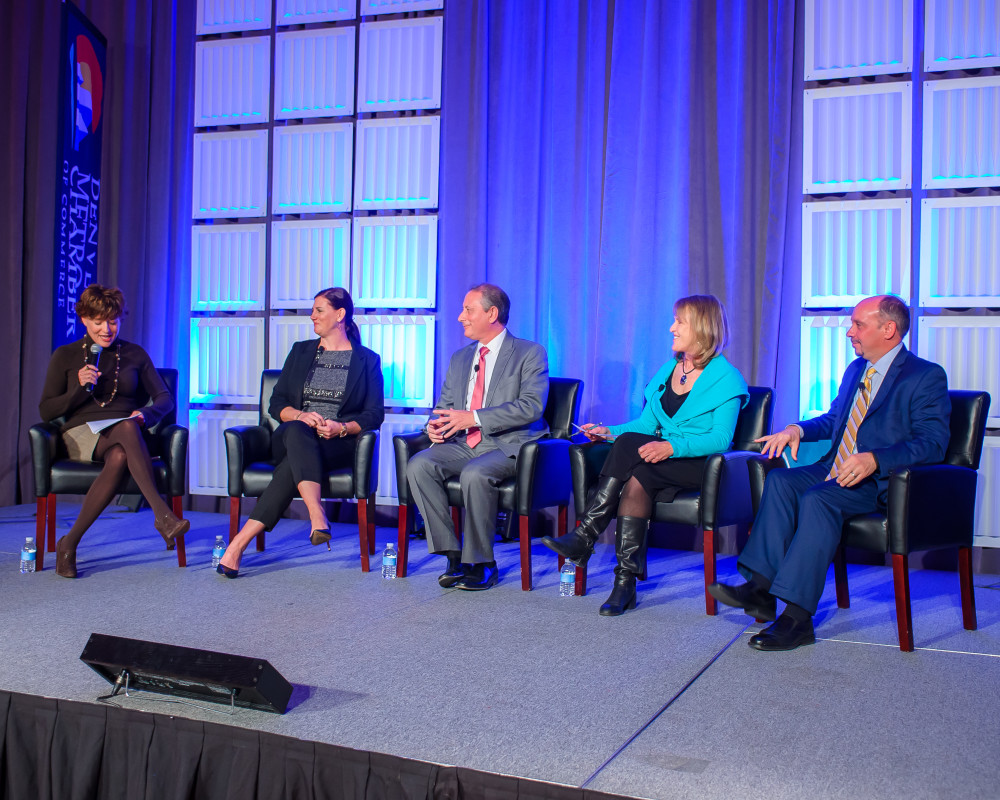
Noel Ginsburg has employees that are 70 years old, and he’s hoping they don’t want to retire anytime soon. The head of a group of advanced manufacturing companies, Ginsburg knows first-hand the challenge of hiring people who have the knowledge and expertise for those jobs.
It highlighted to him there’s a real workforce gap in Colorado, and businesses can no longer point the blame at others for not meeting their hiring needs. It was a sentiment he and other business leaders echoed at the State of Small Business today. They called on businesses large and small to create more connections and work to bring people into jobs through shadowing, internships and apprenticeship opportunities.
“We’re not good at planning for our workforce needs,” Denver Metro Chamber of Commerce President and CEO Kelly Brough told the more than 350 business and education leaders at the event. But, the Chamber and organizations across the state are working together to change that, aiming to prepare people to fill middle skills jobs—those that don’t require a four-year degree—and help them find a path the leads to a lasting career.
Brough was joined by local business leaders Ginsburg, chairman and CEO of manufacturer Intertech Plastics; Lenee Koch, executive vice president and founder of electrical contractor LEI Companies; and Wendy Nkomo, COO of the Colorado Technology Association, as well as national higher education expert Jamie Merisotis, president and CEO of the Lumina Foundation.
Each shared challenges they face in hiring, particularly for jobs that may not require a college education or that have a perception of not being a viable long-term career.
“We have a big perception and brand issue that needs to be changed,” said Koch, whose company funds all its training for new employees. “The biggest key is training educators that this is a career path.”
Ginsburg, who is also heading up the governor’s Business Experiential Learning Commission, said he’s essentially had to create a pipeline for the workers his business needs, working closely with schools.
“The problem is not education, in my opinion,” Ginsburg said. “It’s us.”
And it’s getting students into those companies to experience that work that really opens their eyes to different career paths, Nkomo.
“The students walk away forever changed, and there’s no substitute for that,” she said.
What matters most for the business community, Merisotis said, is to continue to collaborate and keep a sense of urgency, especially as global competition grows.
“In the 21st century, the recipe for success is much more complex,” he said. “Talent is much more than innate ability.”
It’s a call to action that range true for many, as Colorado continues to be ranked as a top place to work and do business.
“As a business community, the most important asset we have is our workforce,” said Abram Sloss, executive director of the Denver Metro Small Business Development Center.
Inaugural Bill Daniels Ethical Leader of the Year Award Given to Evan Makovsky

The Chamber and the University of Colorado Denver Business School recognized Evan Makovsky, a managing partner with NIA Shames Makovsky for his commitment to ethical leadership with the inaugural Bill Daniels Ethical Leader of the Year Award.
“It feels a bit strange accepting an award for acting the way we should all act,” Makovsky said.
He cited Bill Daniels’ eight principles of ethics: integrity, trust, accountability, transparency, fairness, respect, rule of law and viability, as guides for his personal and professional life—and they’ve made his business more efficient and successful.
He added: “I will continue to uphold these principles throughout the remainder of my life.”
Sara Crocker is the communications manager for the Denver Metro Chamber of Commerce.
